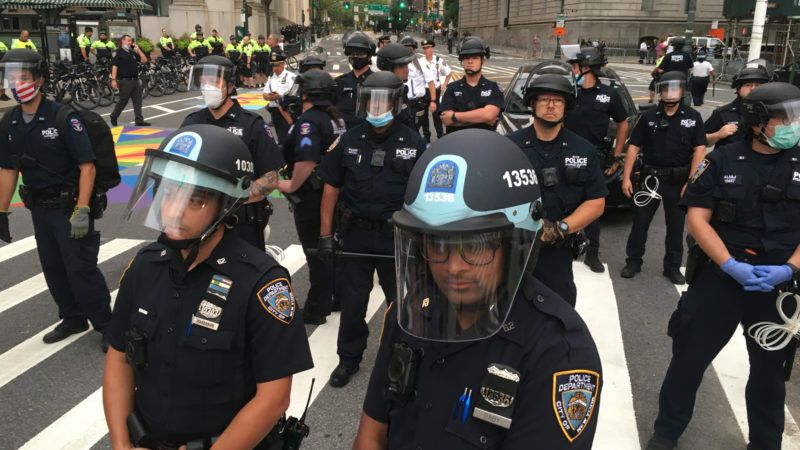New York Police Unions Partly Succeed in Stopping Release of Misconduct Records
A federal judge gags the New York Civil Liberties Union, but a media outlet manages to collect and publish a database of misbehaving cops.

New York City's police and fire unions are fighting in court to block the release of their members' disciplinary records. They've temporarily won one fight, but they may have already lost the war.
New York state has finally—after years of activism from police reformers demanding transparency—repealed Section 50-a, the rule that shielded police and firefighter personnel records from public disclosure laws. The statute had been applied so broadly that it was all but impossible to know what sort of discipline, if any, misbehaving officers faced.
Naturally, the police unions were not going to just step aside as the records were distributed. And so New York is now seeing what we saw in California last year when the Golden State ended its official regime of police record secrecy: lawsuits.
On July 14, a group of seven law enforcement and firefighter unions in New York City filed a federal lawsuit against Mayor Bill de Blasio and other city officials to attempt to stop a mass public release of disciplinary records, most specifically records that were "non-final, unsubstantiated, exonerated, or resulted in a finding of not guilty." The lawsuit argues that even though Section 50-a has been repealed, releasing these past records violates the Due Process rights of the officers and collective bargaining agreements that assured they'd be kept confidential. (To read the lawsuit, Uniformed Fire Officers Association et al v. De Blasio et al, go here.)
On Wednesday evening, the unions won a temporary reprieve from Judge Katherine Polk Failla of the United States District Court, Southern District of New York, who, in an oral ruling, temporarily blocked the de Blasio administration from releasing these records until the case could be litigated.
But thousands of these records had already been passed along to the New York Civil Liberties Union (NYCLU) in response to a records request. Even though the NYCLU is not a party to this lawsuit, Failla nevertheless ordered that the NYCLU refrain from disclosing them to the public.
The NYCLU is not pleased, and it has filed a motion to get Failla's gag order overruled, arguing that the court order is unconstitutional prior restraint. NYCLU Executive Director Donna Lieberman has noted that the NYCLU "obtained police misconduct data lawfully, and we vehemently disagree with the court's unprecedented order to bar the publishing of these records….We'll keep fighting to bring police misconduct into the light of day and make sure police are held accountable."
Gagging the NYCLU didn't stop some discipline records from getting released. The nonprofit media outfit ProPublica also asked the New York's Civilian Complaint Review Board (CCRB) for disciplinary records and received data on thousands of police. They are under no orders from Failla not to publish them, so they've put together a database of active duty officers who have had at least one complaint against them substantiated. Turns out that around 4,000 of the city's 36,000-person police force has had some sort of misconduct complaint deemed substantiated by the CCRB.
ProPublica's database is accessible here. As you read it, keep a couple of caveats in mind. First, the database contains only complaints that were evaluated by the CCRB, plus their findings. The CCRB investigates accusations of mistreatment of civilians by police officers, but not other types of potential police misconduct in the line of duty, such as perjury or corruption. Those other crimes and types of misconduct are investigated by the NYPD's Internal Affairs Bureau and are not part of this database.
Second, the information in the database is very simple. It has the officers' names, some very basic information about what they were accused of, and a contextless listing of the CCRB's recommendations, including possible charges. But these are just recommendations. The CCRB lacks the authority to actually discipline cops. These findings are sent to the police commissioner for the final decision on what to actually do, though the CCRB does have attorneys who can prosecute officers at internal disciplinary trials. So when the database states that the CCRB recommended "charges," this should not be taken to mean that the officer was definitively charged with misconduct and faced some sort of a trial.
All of which to say that all of this information in this database is just the tip of the iceberg. It still doesn't give a clear sense of the extent that NYPD officers are held accountable for conduct that crosses the line.
It's going to take at least months, and probably years, before New Yorkers can truly figure out what the NYPD does with their bad apples. And the police unions will be fighting every step of the way.


Show Comments (21)